| dc.contributor.author | Ngenoh, Peter K | |
| dc.date.accessioned | 2014-11-14T08:52:58Z | |
| dc.date.available | 2014-11-14T08:52:58Z | |
| dc.date.issued | 2014-11 | |
| dc.identifier.citation | Master Of Business Administration , University Of Nairobi, 2014 | en_US |
| dc.identifier.uri | http://hdl.handle.net/11295/74861 | |
| dc.description.abstract | The study sought to determine the challenges of implementing devolution and
planning objectives by the Ministry of Planning and Devolution in Kenya. The
research design for this study was a case study. The study used primary data which
was collected using an interview guide. The interview guide contained three sections:
part A contained questions on general information about the ministry, section B
contained questions on strategy implementation process and section C contained
questions on challenges of strategy implementation in the ministry of devolution and
planning. A face to face interview was conducted with four respondents: two principal
secretaries and their deputies. These respondents were deemed as key informants of
the study because they were highly involved in the implementation of strategies in the
ministry of devolution and planning and at the County governments. The data
obtained from the interview guide was analyzed qualitatively using content analysis.
The study further revealed that the ministry had developed mechanisms and strategy
in achieving organizational objectives. The respondents indicated that the Ministry
had made efforts in mobilizing resources from the government and its international
development partners as well as the savings realized through better management of
available resources. The study found that top management interest and support was
significant in achieving of the objectives of the Strategic Plan. The study further
concluded that the respondents interviewed concurred that there was weak
collaboration and inadequate teamwork between the management and the employees.
This study recommends the ministry should strengthen its human resources
management and development through formulating and reviewing human resource
policies and develop systems for efficient management and development of staff. This
is achieved through developing and providing policy guideline for effective payroll
management. The study recommends that the ministry should work in transforming
quality and efficiency of public service delivery process reengineering by establishing
one stop Huduma Centres in 47 counties to provide integrated public services. The
study suggests that it would be interesting to carry out further in another ministry that
is similar to the ministry of planning and devolution in terms of size and areas of
intervention. Findings can then be compared to assess if there are any commonalities
or unique factors. The study was limited to an in depth case study of the ministry of
planning and devolution therefore, these findings are unique to this ministry and
therefore cannot therefore be generalized to be a representation of all government
ministries in Kenya | en_US |
| dc.language.iso | en | en_US |
| dc.publisher | University of Nairobi | en_US |
| dc.title | Challenges of Implementing Devolution and Planning Objectives by the Ministry of Devolution and Planning in Kenya | en_US |
| dc.type | Thesis | en_US |
| dc.type.material | en_US | en_US |

